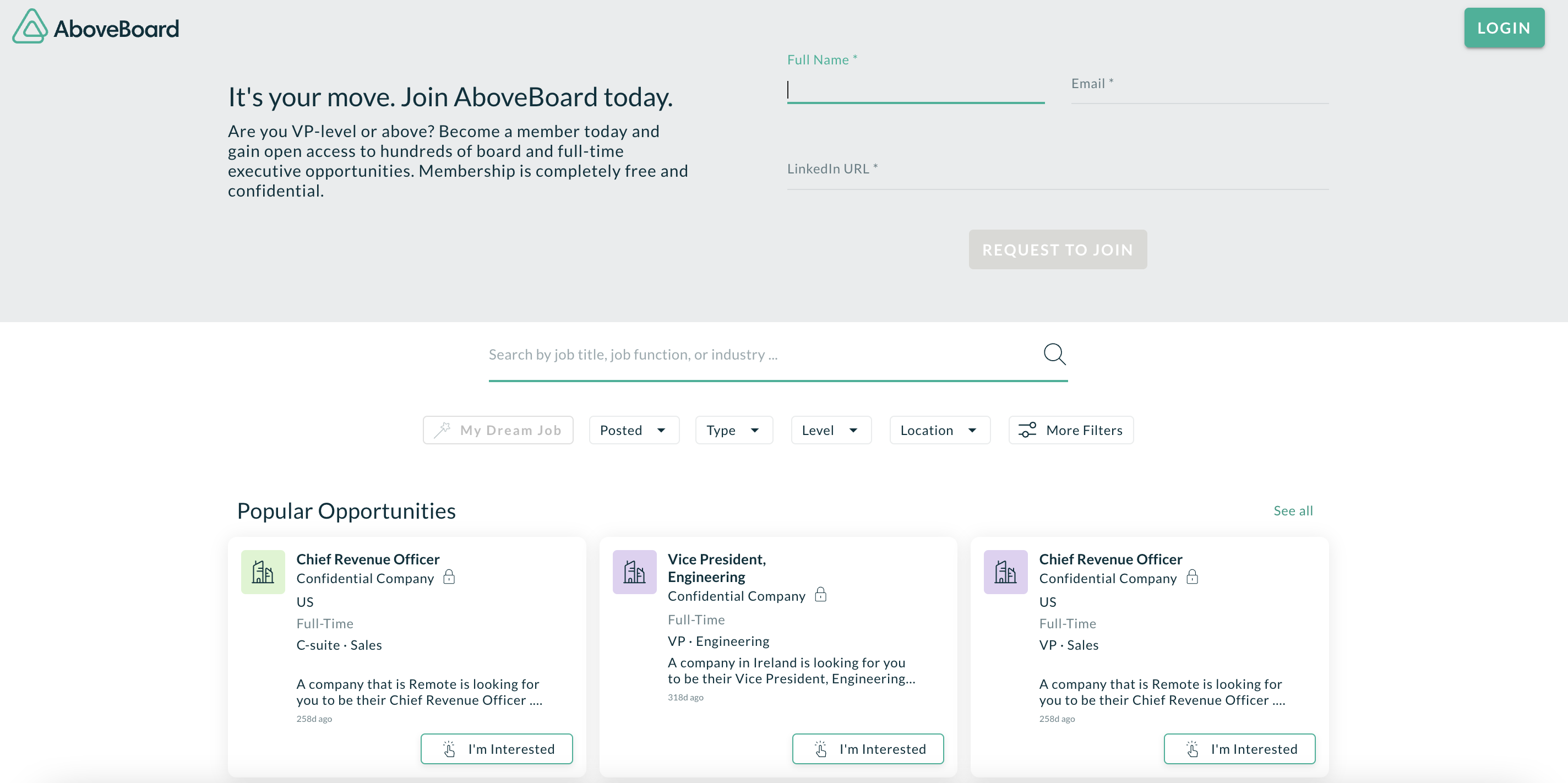Lucinda Duncalfe, CEO and founder of AboveBoard, knows that she’s not the first to try to disrupt hiring pipelines in order to better position diverse candidates. But, the seasoned entrepreneur is optimistic that the angle her company is taking will make a difference, anyways.
The traditional executive hiring world is built in two main strategies: word of mouth or expensive headhunters. AboveBoard aims to tweak that by creating a two-sided marketplace in which employers can post job listings on a platform that they know has a diverse set of candidates.
“There’s a reason that executive hiring has traditionally had a professional services approach and been highly specific, it’s because only 40 people in the world can do that job,” she said. “The trick is to find the additional 10 that can.” Therefore, instead of working as a top of the funnel platform that finds smart people to put into roles, AboveBoard wants to play more at the end of the funnel; finding people who are already qualified and placing them into the jobs they deserve. “It’s pretty easy to top the funnel to ensure diversity at the junior levels,” she added. “It gets harder with each step you go up.”
To help historically overlooked individuals get executive jobs, AboveBoard tells TechCrunch that it has raised $6 million.
The fresh funding comes from True, a global talent market placement platform. The platform has incubated AboveBoard along with Synthesis, a leadership assessment technology and, in the past, Thrive TRM, a hiring software company. Today’s check is in the form of a SAFE note, a capital instrument that allows investors to purchase a number of shares at an agreed upon price in a future financing. Aka, it’s a capital injection without a set valuation, that will be turned into shares upon future raises.
In short, it’s a simplified capital raising instrument that is normally issued at a discount, and that helps boost investor returns whilst speeding up the capital raise for the company. To date, AboveBoard’s financing is $9 million, with the first tranche of capital closed in July 2021.
The true challenge for the startup is if it can get strong, top tier companies to change their ways and consider a platform – not a friend – as a sourcing engine for their next top hire. Duncalfe says she’s noticed that one dynamic within companies is that their first diverse executive hire may be a head of diversity and inclusion; AboveBoard wants to broaden how companies view the role of diverse individuals, beyond in representing the interests of their own.
The competition is steep and well capitalized. Canvas, launched in 2017, raised $20 million last year to help tech companies find diverse talent. The startup’s moat is its avoidance of AI and ability to built a recruiting platform based solely on reported data. Companies can turn to Canvas and filter down what priority groups to hire. Seekout, another diverse recruitment startup, landed a $115 million round in January. Unlike Canvas, Seekout finds diverse talent by “scouring public data and using natural-language and machine-learning technologies to understand the expertise of each candidate to build a complete 360-degree view of each potential employee,” TechCrunch’s Mary Ann Azevedo reports.
AboveBoard differentiates, in its view, by explicitly focusing on executive roles. Only a handful of large companies handle the executive recruitment role, and Aboveboard has one of those companies – True – on its team (literally). True helped kickstart AboveBoard by posting client searches and sharing partnerships, a necessary influx of info for a startup aiming to build a marketplace.

Duncalfe thinks that the Black Lives Matter movement has played a massive role in getting companies to take diversity more seriously. One side effect of a louder conversation on representation in decision-making roles is that limited partners are requiring diversity metrics to be reported of their portfolio companies. Quantitative analysis has a way of getting companies to wake up.
So far, AboveBoard says that the most in demand roles are heads of HR, marketing and sales. After launching in October 2020, AboveBoard landed over 6,000 executives and 400 companies by July 2021. Now, in May 2022, the company has over 30,000 approved members – who are all on the platform free of charge – and 1,300 companies. “We overrepresented the underrepresented,” Duncalfe said.

